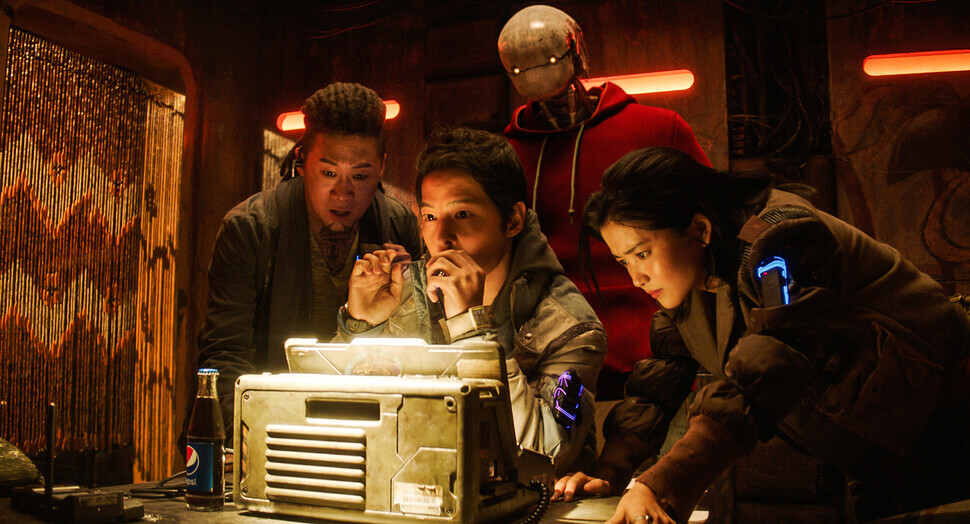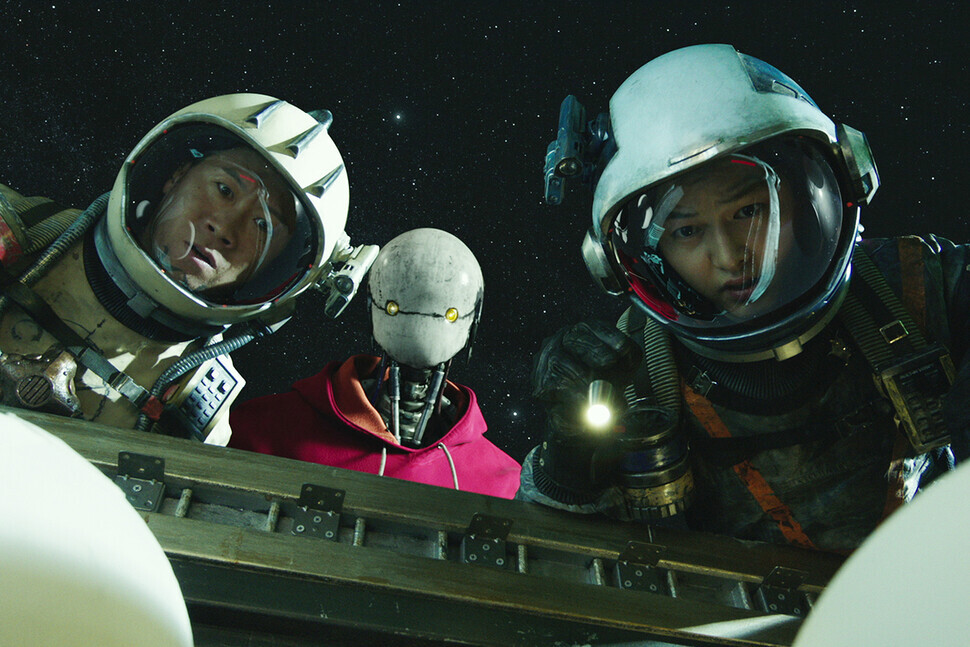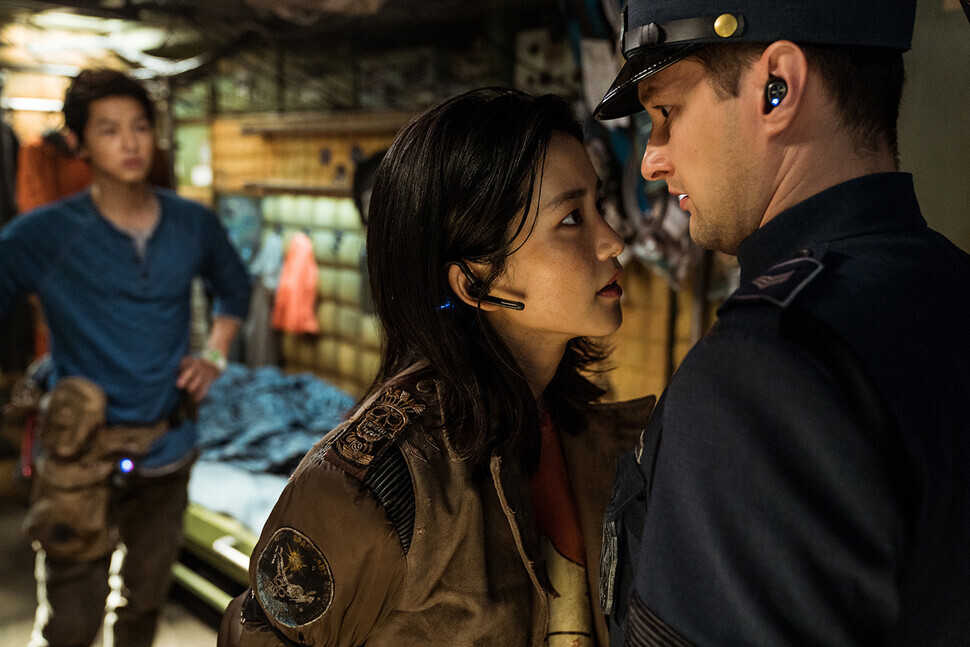hankyoreh
Links to other country sites 다른 나라 사이트 링크
S. Korean sci-fi film “Space Sweepers” rockets to top spot on Netflix global list

“Space Sweepers,” South Korea’s first space-based sci-fi film, has enjoyed global popularity since its release on Feb. 5 in 190 countries around the world via the Netflix video streaming service.
According to flixpatrol.com, a website that ranks video content, “Space Sweepers” was the most-watched film on Netflix worldwide for two days in a row on Feb. 6-7.
“This was just completely unexpected. It’s the first time I’ve felt non-Koreans responding to a film I’ve made, and I feel amazed and grateful,” said Jo Sung-hee, the film’s director, during an online video interview on Feb. 8.

Set in 2092, “Space Sweepers” tells the story of the crew of the Victory, a ship that picks up interstellar debris. When the crew stumble upon “Dorothy,” a humanoid robot who’s said to be a weapon of mass destruction, they set up a dangerous swap.
Jo explained that he’d first envisioned the film ten years ago, after being fascinated by what a friend had told him about trash in space.
“I figured that if the main characters were in charge of picking up trash in space, they wouldn’t need to be heroes in fancy outfits. I thought that Korean main characters would be believable if they were doing unpleasant and dangerous jobs,” Jo said.
Jo kept developing his script for “Space Sweepers” even while he was making his debut feature-length film “A Werewolf Boy” (2012) and his second film “Phantom Detective” (2016). Now he’s finally managed to finish his third film and release it to the public.
“‘Space Sweepers’ was the first feature-length script I wrote after deciding to make films for a living. I can still hardly believe I was able to make this into a movie and bring it to audiences,” Jo said.
“The whole thing just feels like a dream — I’m still in shock.”

The graphics in “Space Sweepers” have been described as just as good as those in Hollywood films.
“During preproduction, we came up with an efficient approach for deciding what could be done with CGI and what could not,” Jo explained.
“We had three basic rules. First, scenes shot with actual actors had to mesh well with those that were entirely CGI. Second, objects in space had to feel natural in the light. And third, since the spaceship is being run by impoverished workers, we had to adjust the speed to make the chase scenes feel more rough-and-tumble.”
Jo also admitted that making the film involved some challenges — and some trial and error.
“We had a lot of trouble creating special effects in scenes where there are explosions and little particles flying everywhere. The special effects artists had to hash things out, since they all pictured the scenes differently in their heads. It was hard to keep the scenes from looking unrealistic.”
A total of ten companies, including DexterStudios, worked on CGI for “Space Sweepers.”
“I would guess that our CGI cost between one-seventh and one-tenth of what it costs for a Hollywood film,” Jo said.
While the film’s effects have received universal acclaim, reviewers are split on the more melodramatic elements of the story.

Jo explained, “I’m interested in stories of families. I wanted to make a story about people who have lost their real families and are now coming together and making a new family. I tried to avoid melodrama, but some of that slipped in anyway because of the family angle.”
Jo also responded to criticism that the film overlaps in considerable ways with other sci-fi films. “After coming up with the idea for the film, I watched other similar films, which encouraged me about the possibilities [of the genre],” he said. “I guess I was more interested in casing out the starting point than in setting my film apart.”
“‘Space Sweepers’ is a film about finding harmony in an alternative family, which I see as a point of contrast [with other sci-fi films],” Jo added.
The director explained the significance of the spaceship’s name Victory — which doubles as the Korean title of the film.
“At first, I named the ship that because I thought it had positive connotations, while being kind of cute and even a little goofy. But as I worked on the script, I discovered its true meaning,” Jo said.
“You see, I’d wanted the film to wrestle with how we can get along with people who are in a different position, or have different ideas, rather than trying to eliminate or eradicate them. I see it as an ironic name that raises the question of what true victory is.”
By Suh Jung-min, staff reporter
Please direct comments or questions to [english@hani.co.kr]

Editorial・opinion
![[Editorial] Penalties for airing allegations against Korea’s first lady endanger free press [Editorial] Penalties for airing allegations against Korea’s first lady endanger free press](https://flexible.img.hani.co.kr/flexible/normal/500/300/imgdb/original/2024/0502/1817146398095106.jpg) [Editorial] Penalties for airing allegations against Korea’s first lady endanger free press
[Editorial] Penalties for airing allegations against Korea’s first lady endanger free press![[Editorial] Yoon must halt procurement of SM-3 interceptor missiles [Editorial] Yoon must halt procurement of SM-3 interceptor missiles](https://flexible.img.hani.co.kr/flexible/normal/500/300/imgdb/child/2024/0501/17145495551605_1717145495195344.jpg) [Editorial] Yoon must halt procurement of SM-3 interceptor missiles
[Editorial] Yoon must halt procurement of SM-3 interceptor missiles- [Guest essay] Maybe Korea’s rapid population decline is an opportunity, not a crisis
- [Column] Can Yoon steer diplomacy with Russia, China back on track?
- [Column] Season 2 of special prosecutor probe may be coming to Korea soon
- [Column] Park Geun-hye déjà vu in Yoon Suk-yeol
- [Editorial] New weight of N. Korea’s nuclear threats makes dialogue all the more urgent
- [Guest essay] The real reason Korea’s new right wants to dub Rhee a founding father
- [Column] ‘Choson’: Is it time we start referring to N. Korea in its own terms?
- [Editorial] Japan’s rewriting of history with Korea has gone too far
Most viewed articles
- 1Bills for Itaewon crush inquiry, special counsel probe into Marine’s death pass National Assembly
- 2[Reporter’s notebook] In Min’s world, she’s the artist — and NewJeans is her art
- 3Months and months of overdue wages are pushing migrant workers in Korea into debt
- 4[Editorial] Penalties for airing allegations against Korea’s first lady endanger free press
- 51 in 3 S. Korean security experts support nuclear armament, CSIS finds
- 6Trump asks why US would defend Korea, hints at hiking Seoul’s defense cost burden
- 7S. Korea discusses participation in defense development with AUKUS alliance
- 860% of young Koreans see no need to have kids after marriage
- 9[Column] Can Yoon steer diplomacy with Russia, China back on track?
- 10At heart of West’s handwringing over Chinese ‘overcapacity,’ a battle to lead key future industries